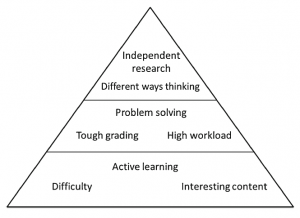How can we grade participation more effectively?
Maryellen Weimer argues that the way we usually grade participation in our classes doesn’t work. That is, many students still don’t join the conversations for fear of looking dumb. The typical grading approach also rewards quantity over quality. In an article in Faculty Focus, she writes about a colleague’s solution to this: using “extra-credit engagement tickets” students earn by completing assignments on time, joining online discussions, and submitting questions electronically. I agree with the logic, but the solution seems more complicated than I’m willing to attempt. This is definitely something that deserves more attention from most faculty members, though.

What does ‘rigor’ in a course mean?
Students tend to equate a course’s rigor with workload rather than higher-order thinking, according to a study in the latest issue of Innovative Higher Education. That is, if a course required students to read or write more than they were used to, they generally considered it rigorous. The same held true if a student thought the professor’s grading standards were higher or if the student had little or no previous experience with the course content. This differs from faculty members’ idea of rigor, which the authors described as “learning meaningful content with higher-order thinking at the appropriate level of expectation within a given context.” The authors say that students and faculty need to understand these divergent views so that colleges and universities can better address the importance of academic standards. The study is called “Developing a Student Conception of Academic Rigor.”
Study questions value of degrees from for-profit online institutions
Research by the National Bureau of Economic Research strongly suggests that employers value degrees from public institutions over those from for-profit online institutions. The authors of a white paper posted on the bureau’s website found that candidates with bachelor’s degrees from for-profit online institutions were 20 percent less likely to receive a request for an interview or for additional information from employers than those with degrees from public institutions. (A 2012 employer survey conducted by The Chronicle of Higher Education found similar perceptions.) They say that given the high costs, degrees from those for-profit institutions “do not appear to be a sound investment.”
Briefly …
Meris Stansbury of eCampus News writes about the steps involved in a competency-based education program, and about the fluid definition of those types of programs. … An anonymous graduate student, writing in The Guardian, argues that colleges and universities need to more transparent about the time commitments of graduate teaching assistants. “Teaching is often regarded as something of an afterthought to doctoral completion, something fobbed off on those considered just competent enough,” the writer says.